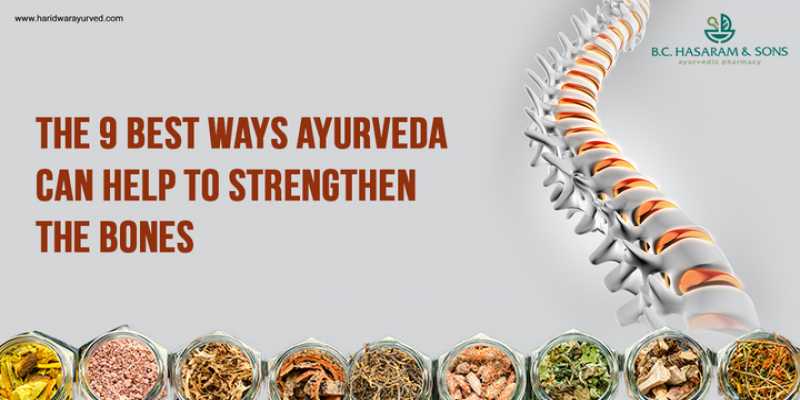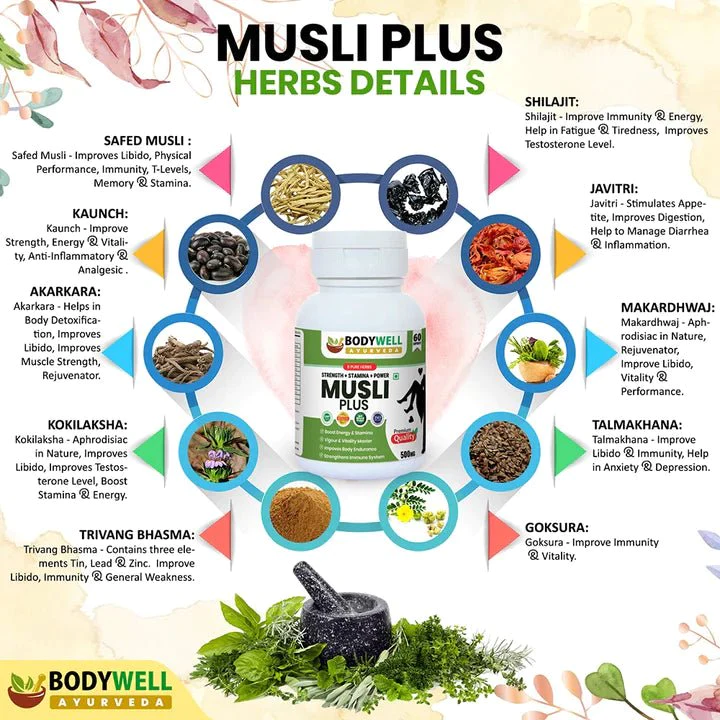Muscle Power By Ayurveda-24
Muscle Power By Ayurveda
An individual’s muscle power is their capacity to exert force and carry out physical labour. For a variety of activities, from daily chores to athletic performance, it is a crucial aspect of total physical health. Many factors, including muscle size, type of fibre, neuromuscular coordination, and training, affect how much force a muscle can produce.

With a holistic approach to health and well-being, Ayurveda is a traditional medical practice that has its roots in India. Though the concept of “muscle power” is not employed in the same sense as it could be in contemporary fitness or athletic contexts, Ayurveda offers advice on preserving general physical vigor and strength. To support the health of your Muscle Power By Ayurveda, consider the following Ayurvedic principles:
Ayurveda acknowledges the three basic forces, or doshas, that impact a person’s constitution: vata, pitta, and kapha. For general health, including the health of the muscles, these doshas must remain in balance.
- Nutrition & Diet: According to Ayurveda, a healthy, balanced diet that is suited to each person’s dosha (or constitution) is essential. Muscle health is supported by consuming enough protein and other nutrients.
- Supplements and Herbs: To promote general health, Ayurvedic supplements and herbs are frequently employed. For example, ashwagandha is well-known for its adaptogenic qualities and may support strength and physical endurance. Another plant linked to muscle health is gokshura (Tribulus terrestris).
- Regular oil massage, also referred to as abhyanga, is a popular Ayurvedic procedure. It is thought to support general flexibility and strength, ease muscle tension, and increase circulation.
- Yoga and Exercise: Regular exercise is recommended by Ayurveda, and yoga is thought to be helpful in preserving physical strength, flexibility, and balance. Different muscle groups can be targeted with different yoga poses and exercises.

- Sleep and rest: Sufficient sleep and rest are essential for maintaining general health, which includes the repair and recuperation of muscles. Ayurveda places a strong emphasis on the value of a healthy daily schedule that includes enough sleep to promote general wellbeing.
- Ayurvedic Massage Treatments: Apart from oil massage, several Ayurvedic massage treatments like Pinda Sweda (herbal bolus massage) and Navarakizhi (rice bolus massage) are thought to enhance muscle vigour and strength.
How to maintain Muscle Power?
A balanced diet, frequent exercise, enough sleep, and other healthy lifestyle choices are all necessary to maintain muscle power. To assist you sustain your muscle power, consider the following general guidelines:
Strength Exercise:
Exercise your strength on a regular basis. To work several muscular groups, concentrate on compound exercises like squats, deadlifts, bench presses, and overhead presses.
Incorporate weighted resistance training as well as bodyweight workouts to develop and preserve muscle strength.
Follow Our Digiknowledge.co.in Page for Latest update about Bikes, Cars, Sports, , Life style and many more.
Cardiovascular Workout:
Include cardiovascular workouts to enhance general fitness and promote cardiovascular health. Exercises including cycling, swimming, jogging, and high-intensity interval training (HIIT) can be included in this.
Mobility & Flexibility:
To keep your flexibility and lower your chance of injury, do mobility and stretching exercises. For improving general muscle function and flexibility, yoga or pilates may be helpful.
Optimal Nutrition:
Eat a well-balanced diet that includes sufficient amounts of healthy fats, carbs, and protein. For the growth and repair of muscles, protein is especially crucial.
Maintaining your fluid intake will help your muscles and general wellness.
Proper Consumption of Protein:
As protein is essential for both muscle maintenance and regeneration, make sure your diet contains adequate of it. Plant-based protein sources, dairy products, eggs, fish, poultry, lean meats, and lentils are all good sources.

Drinking lots of water
Keep yourself hydrated by drinking adequate water. Muscle performance can be impacted by dehydration.
Sufficient Time for Rest and Recuperation:
Give your muscles ample time to recuperate. Sleep is essential for good health in general, and for the growth and repair of muscles in particular.
Setting a time period:
In order to avoid overtraining and plateauing, change up your workout regimen. Include a variety of workouts, levels of difficulty, and methods of instruction.
Refrain from Overtraining
As overtraining can result in weariness, diminished performance, and a higher chance of injury, pay attention to your body’s needs.
Communicate with Experts:
To create a customized workout programmed based on your objectives, current level of fitness, and any particular health concerns, think about speaking with a fitness trainer or medical expert.
Routine Health Examinations:
Plan routine check-ups to keep an eye on your general health and to catch any possible problems early.
Keep in mind that each person has a unique body, thus it’s critical to customize your strategy to meet your unique wants and objectives.
Before making big changes to your food or exercise regimen, it’s best to speak with a healthcare provider or fitness expert if you have any pre-existing health ailments or concerns.
How to make muscles strong by Ayurveda?
A great technique to relieve tense muscles is abhyanga.
A plant called shilajit promotes both increased energy and good tissue regeneration.
As a supplement to build muscle, ashwagandha is a great plant to consume.
Exercise lightly and healthily.
What helps build muscle naturally?
In order to grow muscle and prevent excess fat accumulation, a person’s daily energy expenditure should be exceeded by adequate intakes of protein, fat, and calories.
What foods help grow muscle?
Dairy products; eggs, Lean meat, Fish, whole grains, legumes and beans, and whey protein.




